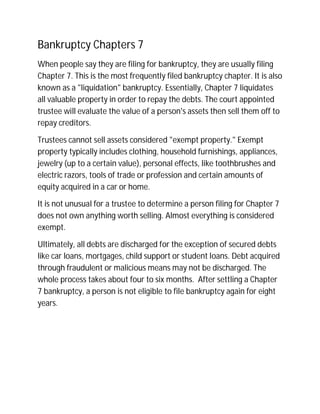Report
Share
Download to read offline

Recommended
Recommended
More Related Content
Viewers also liked
Viewers also liked (13)
Similar to Bankruptcy chapters 7
Similar to Bankruptcy chapters 7 (20)
Chapter 7 bankruptcy you're direct to a fresh start.

Chapter 7 bankruptcy you're direct to a fresh start.
How is Real Estate Investment Treated in Bankruptcy?

How is Real Estate Investment Treated in Bankruptcy?
CAN I FILE BANKRUPTCY AGAIN EVEN IF I HAVE FILED BEFORE

CAN I FILE BANKRUPTCY AGAIN EVEN IF I HAVE FILED BEFORE
10 Secrets to Successful Private Lending - July 2015

10 Secrets to Successful Private Lending - July 2015
Bankruptcy chapters 7
- 1. Bankruptcy Chapters 7 When people say they are filing for bankruptcy, they are usually filing Chapter 7. This is the most frequently filed bankruptcy chapter. It is also known as a "liquidation" bankruptcy. Essentially, Chapter 7 liquidates all valuable property in order to repay the debts. The court appointed trustee will evaluate the value of a person's assets then sell them off to repay creditors. Trustees cannot sell assets considered "exempt property." Exempt property typically includes clothing, household furnishings, appliances, jewelry (up to a certain value), personal effects, like toothbrushes and electric razors, tools of trade or profession and certain amounts of equity acquired in a car or home. It is not unusual for a trustee to determine a person filing for Chapter 7 does not own anything worth selling. Almost everything is considered exempt. Ultimately, all debts are discharged for the exception of secured debts like car loans, mortgages, child support or student loans. Debt acquired through fraudulent or malicious means may not be discharged. The whole process takes about four to six months. After settling a Chapter 7 bankruptcy, a person is not eligible to file bankruptcy again for eight years.
